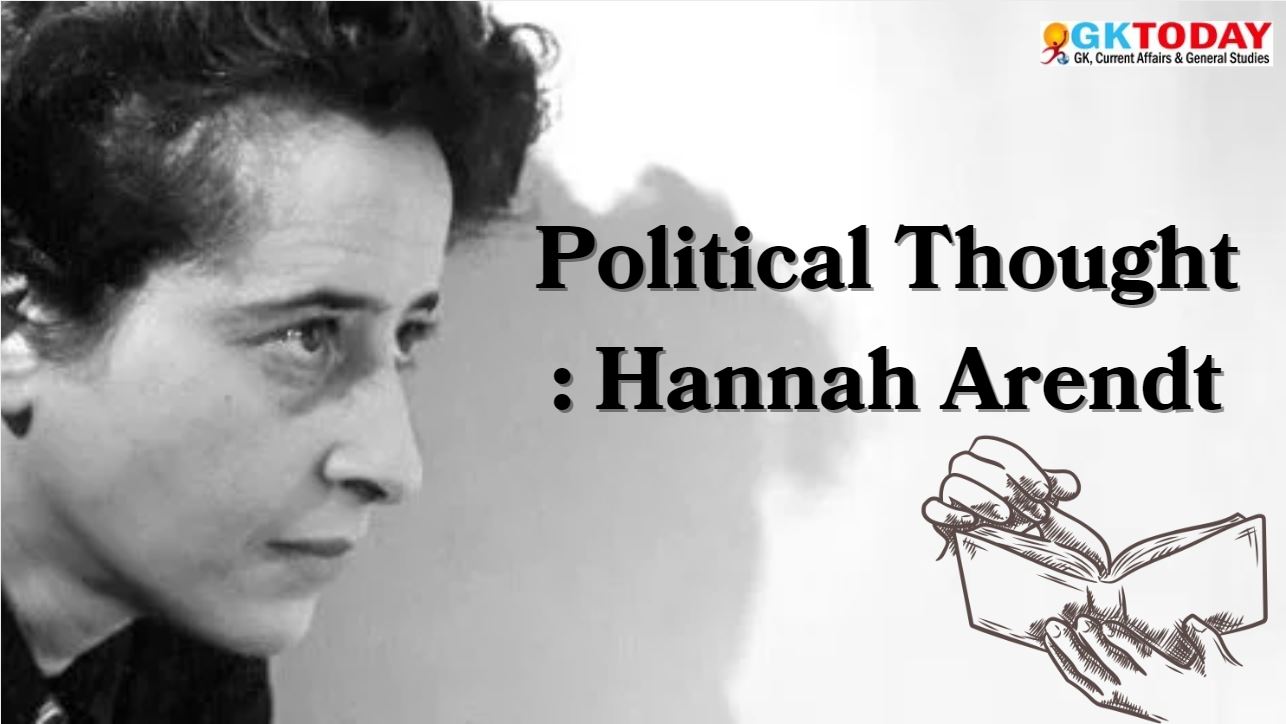UGC-NTA NET Political Science – Political Thought: Hannah Arendt
Hannah Arendt was a prominent 20th-century political theorist whose ideas have shaped contemporary political thought. Born on October 14, 1906, in Hanover, Germany, Arendt’s life and work were deeply influenced by the tumultuous events of her time, including the rise of totalitarian regimes. Her writings explore complex themes such as totalitarianism, the nature of evil, and the importance of political action.
Biographical Overview
Hannah Arendt’s early life laid the foundation for her intellectual journey.
- Birth: October 14, 1906, in Hanover, Germany.
- Death: December 4, 1975, in New York City, USA.
- Education: Studied philosophy, theology, and political science at several prestigious universities, including the University of Marburg, University of Freiburg, and University of Heidelberg.
- Influences: Influenced by notable philosophers such as Martin Heidegger, Karl Jaspers, and Immanuel Kant.
- Exile: Fled Nazi Germany in 1933, becoming a stateless person and later acquiring U.S. citizenship in 1951.
Major Works
Arendt’s writings reflect her deep engagement with political theory and history.
- “The Origins of Totalitarianism” (1951): An analysis of totalitarian regimes, focusing on Nazism and Stalinism.
- “The Human Condition” (1958): Explores human activities, distinguishing between labour, work, and action.
- “Eichmann in Jerusalem” (1963): A report on Adolf Eichmann’s trial, introducing the concept of the “banality of evil.”
- “On Revolution” (1963): Compares the American and French revolutions, denoting freedom and political action.
- “The Life of the Mind” (1978): Posthumously published work discussing thinking, willing, and judging.
Key Concepts
Arendt’s theories encompass several key concepts that are essential for understanding her political philosophy.
Totalitarianism
Totalitarianism is defined as a political system that seeks to dominate all aspects of life. It is characterised by:
- A single, all-encompassing ideology.
- A mass party that controls the state.
- Use of terror to suppress dissent.
- Monopolisation of communication.
The Banality of Evil
This concept, introduced in “Eichmann in Jerusalem,” suggests that ordinary individuals can commit evil acts by conforming to state ideologies without critical reflection. Eichmann exemplified this notion as a bureaucrat who facilitated horrific acts while believing he was merely doing his job.
The Human Condition
Arendt distinguishes between three fundamental human activities:
- Labour: Biological necessity for survival.
- Work: Creation of an artificial world.
- Action: Political engagement and interaction with others.
Public vs. Private Realm
Arendt emphasises the significance of the public sphere for political action. She argues that political discourse should occur in public spaces, contrasting this with the private sphere, which pertains to individual life.
Freedom and Action
True freedom, according to Arendt, is achieved through action in the public realm. This is where individuals express their identities and exercise their agency.
Political Philosophy
Arendt’s political philosophy critiques modernity and advocates for active political engagement.
Critique of Modernity
Arendt critiques the decline of meaningful political engagement in modern societies. She argues that individuals must actively participate in public life to reclaim political significance.
Plurality
She stresses the importance of diversity in political life. Plurality enriches human experience and enhances political discourse, encouraging a more inclusive society.
Judgment
Arendt marks the necessity of judgment in political action. Critical thinking and moral responsibility are essential for ethical political engagement.
Influence and Legacy
Arendt’s impact on political theory is deep and multifaceted.
Impact on Political Theory
Her analysis of totalitarianism and the nature of evil has influenced contemporary political thought. Scholars continue to reference her work in discussions surrounding democracy and authoritarianism.
Feminist Thought
Arendt’s concepts, particularly the public/private distinction, have been engaged with in feminist theory. Her insights on women’s roles in political life continue to resonate.
Continued Relevance
Arendt’s writings remain pertinent in contemporary discussions on civil rights, authoritarianism, and political engagement. Her ideas challenge individuals to reflect on their roles in society.
Criticism
Despite her contributions, Arendt faced criticism for some of her views.
Controversial Views
She was critiqued for her portrayal of Jewish leaders during the Holocaust in “Eichmann in Jerusalem.” Some argued that her analysis was insensitive and oversimplified complex dynamics.
Philosophical Debates
Arendt engaged in intellectual debates with other philosophers, including existentialists and Marxists. Her disagreements often centred on fundamental differences in understanding human nature and political action.
Key Quotes
Arendt’s writings are rich with thought-provoking statements. Here are a few notable quotes:
- “The sad truth is that most evil is done by people who never make up their minds to be good or evil.”
- “Action is the only way in which we can be truly free.”
Hannah Arendt’s contributions to political thought are invaluable. Her exploration of totalitarianism, the nature of evil, and the significance of political action continues to inspire scholars and activists alike. Through her works, Arendt challenges us to engage critically with our political realities and to recognise the power of individual action in shaping society.







